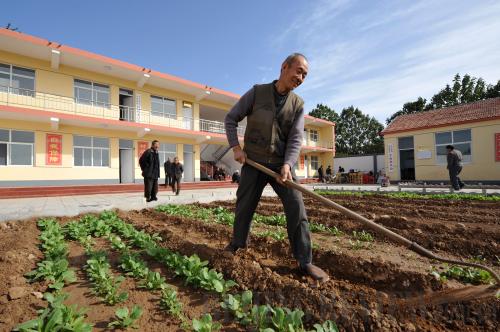|
 |
|
MAKING RETIREMENT COLORFUL: A retired man grows vegetables in a nursing home in Handan, Hebei Province (ZHENG RONGXI) |
Tony Hsiang, 29, is an employee of CYTS, a travel agency based in Beijing. Each month, he pays 8 percent of his average monthly wage, or around 800 yuan ($128.24), to his pension account. And his employer pays 20 percent of his average monthly wage to what's called a social collection fund. The two together make up China's pension scheme for company employees.
But a disturbing bit of news made Hsiang worry.
In 2011, China's pension deficit reached some 76.7 billion yuan ($12.3 billion), an increase of some 9 billion yuan ($1.44 billion) from a year earlier, according to the China Pension Report 2012 released by the Chinese Academy of Social Sciences (CASS), China's top think tank, on December 17.
Worse still, the shortfall in the individual account reached 2.22 trillion yuan ($355.9 billion) in 2011.
"Now the shortfall in individual contributions is enormous. I'm worried that my pension will be affected when I retire," said Hsiang.
In light of this alarming trend, experts are calling for urgent reforms to tackle the pension dilemma.
Why the gap?
China currently operates a multiple-track pension system. First, the government pays the pensions of those working in government departments and public institutions. Second, employees of companies are subject to the pension fund system composed of individual accounts and the social collection fund. Third, farmers participate in the new social insurance system that was established in 2009. The basic social pension for farmers set by the Central Government is 55 yuan ($8.66) per person per month, and local governments can increase the standard in accordance with local conditions.
At present, the deficit appeared in the pension fund for the second category. The country established the pension fund system for company employees in 1997. Back then, there were more than 30 million enterprise retirees. When they began receiving pensions, the money mostly came from the social collection fund, because enterprise employees did not pay a share for their pension before the establishment of the pension system.
Still, the social collection fund isn't enough, and local governments have to divert funds from individual accounts. Over the years, the gap has only expanded. According to CASS figures, from 2008 to 2010, the shortfall grew from 1.4 trillion yuan ($220.47 billion) to 1.7 trillion yuan ($267.72 billion), and from 2010 to 2011, the shortfall rose by 500 billion yuan ($78.74 billion).
Under the current system, there won't be enough cash to pay pensions by 2015, according to the Institute of Finance and Trade Economics under the CASS. Worse still, a report released by the World Bank shows that China's pension fund will have a shortfall of 9.15 trillion yuan ($1.44 trillion) by 2075 if the status quo remains.
At present, company pensions have not been affected, with central and local government subsidies making up for the deficit.
According to the China Pension Report 2011 released by the CASS, from 1997 governments at various levels have granted 1.25 trillion yuan ($196.85 billion) in subsidies to the pension fund. By the end of 2011, two-thirds of the country's total pension fund was comprised of government subsidies.
There are two main reasons for the massive shortfall from employee contributions. First, before the establishment of the pension fund system, company employees didn't pay premiums, but withdrew pensions after they retired. Where did the money come from? It came from funds diverted from current pension payers. This led to a huge shortfall in the individual account. Second, pensions in China have been increasing at an average rate of 10 percent for the past years, and the government has been more focused on issuing and subsidizing pensions rather than solving the shortfall, wrote Yu Fenghui, a renowned business commentator, on his blog.
Zheng Bingwen, Director of the Global Pension Fund Research Center at the CASS, said the pressure of pension shortfalls is growing because of an increasing life expectancy and shrinking workforce resulting from China's family planning policy.
| 